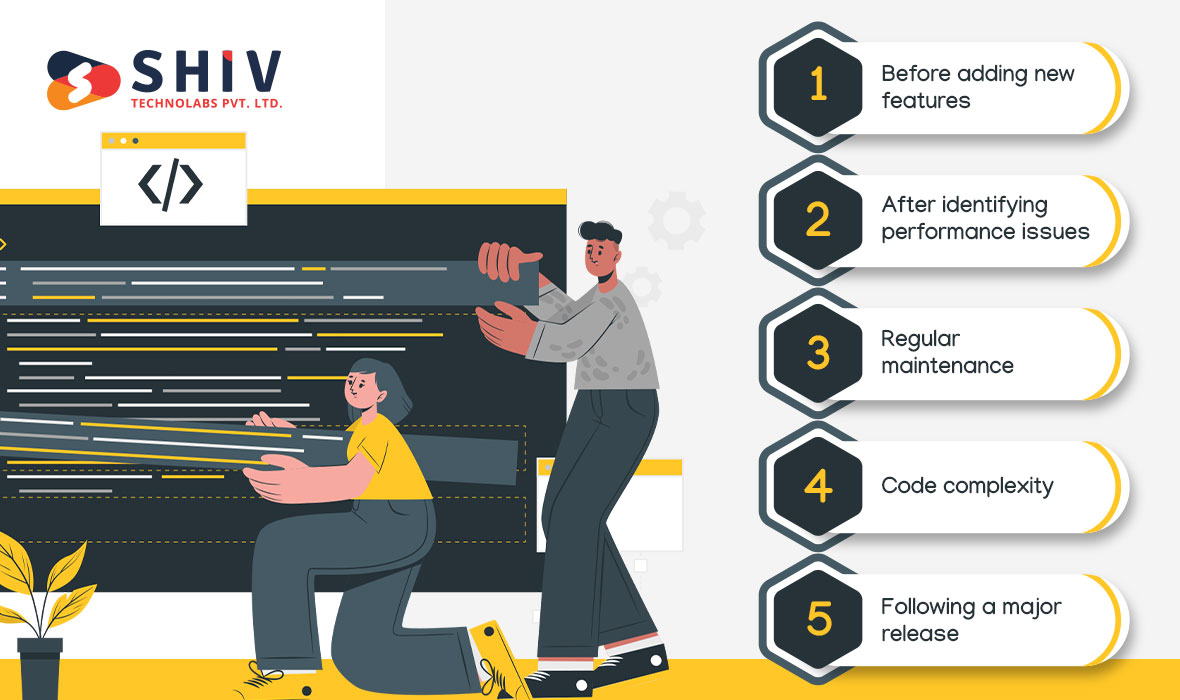In the fast-paced mobile app development world, the upkeep and the upgrade of the app is as significant as its launch. One of the most effective means to ensure an app's persistence and adaptability is code refactoring.
This process entails improving the back end code without affecting the app's functionality or front end look. As apps grow and adapt, refactoring is an integral part for supporting performance, enhancing readability, and simplifying future updates.
Code Refactoring: Overview

Code refactoring is a systematic procedure of improving code without affecting its external behavior. The main objective for the code refactoring is to make it more efficient, readable as well as understandable.
which later on will facilitate the easier maintenance and extension of the application. This process can sometimes include redesigning code, simplifying, removing unnecessary code, and enhancing algorithms.
What is the Importance of Code Refactoring?
Refactoring is not about debugging or adding new features. Contrary to this, it focuses on improving the quality of the codebase. Below are the several reasons why refactoring is key to your app's long-term success:
- Improved code quality: Refactoring turns the code into a cleaner and more effective version of itself. It ensures that the code is error-free and also makes it easier for other app developers who will work on the app to maintain it.
- Enhanced performance: One way that refactoring contributes to the app's performance is by eliminating redundancies and optimizing existing algorithms. Users enjoy better page performance with quicker load times and better responsiveness, thus leading to increased satisfaction.
- Scalability: When your app grows, it is obvious that you will have to add new features in the process. Refactoring prepares your codebase for seamless integration of these new features with no additional complexity or performance degradation.
- Easier maintenance and updates: Well-structured code makes it easy to update the app or fix the bugs. Developers can effortlessly navigate the code and make any necessary revisions without affecting the app’s functionality, thus saving time and resources effectively.
- Fosters innovation: A readable, clearly documented codebase inspires creativity. Developers can test out new features and alterations without being disturbed by complex coding and make a path for continuous evolution and upgradation of the app.
When to Refactor Your Code?

Knowing when to refactor is crucial. Here are a few scenarios where refactoring becomes necessary:
- Before adding new features: Refactoring before integrating new features ensures the existing codebase is in its best shape, reducing the risk of complications. It's like tidying up your workspace before starting a new project, setting the stage for smoother development.
- After identifying performance issues: If your app starts to lag or exhibit poor performance, it's a clear sign that your code may be inefficient or bloated. Refactoring in this scenario can enhance performance, leading to a better user experience.
- Regular maintenance: Incorporating refactoring into your regular maintenance routine keeps your code healthy. Like routine health check-ups, this proactive approach can prevent minor issues from becoming major problems down the line.
- Code complexity: When your code becomes too complex to easily understand or modify, it's time to refactor. Simplifying complex code not only makes it more readable for current and future developers but also reduces the likelihood of errors.
- Following a major release: After launching a major update or release, consider refactoring as part of your post-release optimization. This can help consolidate any rapid developments made during the release cycle and improve overall code quality for future updates.
Leveraging Professional Mobile App Development Services
Refactoring is a task that requires deep technical expertise and a thorough understanding of the app's architecture. This is where professional mobile app development services come into play. These services can provide the expertise needed to refactor your code effectively, ensuring that your app remains competitive and future-proof.
The Benefits of Professional Services:
- Expert guidance: Professionals bring years of experience in app development and refactoring, ensuring that the process is carried out efficiently and effectively.
- Best practices: By partnering with a best mobile app development company, you gain access to industry best practices and the latest tools and technologies for code refactoring.
- Risk mitigation: Professionals understand how to refactor code in a way that minimizes the risk of introducing new bugs, ensuring a smooth transition.
Conclusion
Code refactoring is not just a task to be undertaken when problems arise; it is a continuous practice that is crucial for the long-term success and sustainability of your mobile app. Collaborating with Shiv Technolabs for code refactoring, app owners can leverage expert knowledge and best practices to enhance their app's codebase effectively. With the right approach and the support of the best mobile app development company, your app can continue to evolve and succeed in the ever-changing digital landscape.


No comments yet